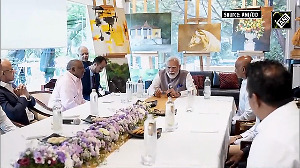Whoever said only information technology is the golden goose for India? Wrong, for religious process outsourcing could certainly be the next big thing.
Believe it or not, but the shortage of priests in the United States, the United Kingdom and other western countries and the low cost of conducting these prayers in India has led to outsourcing of prayers.
From churches in Kerala to gurdwaras in Punjab and temples and ashrams all across the country are receiving 'bulk orders' for mass, pujas, havans and akhand paath. And how big is the 'spiritual business' is anybody's guess.
"The concept isn't as outlandish as it sounds. Intercessory prayers - where one person prays for, or on behalf of, someone else, who is religiously challenged -- is regularly practised by many beliefs and even has the approval of the Vatican", says Fr. Dominique Emmanuel, spokesman of Delhi Catholic Archdiocese.
"Religious outsourcing is not something which has sprung up overnight. It has been happening for quite sometime now but drawn media attention because of the debate on outsourcing now," says Fr. Emmanuel.
"Religious outsourcing is on the rise because of a general decrease in the number of vocations in west, especially of priests and nuns. This is happening since the late 1960s, when new ideas came in to the Church and many priests left their orders," he says.
He says in Catholics, priests offers a mass with an intention every morning. But because of the shortage of priests, mass cannot be arranged for every intention. Thus most of them are outsourced to India, or for that matter, any other country which has no shortage of priests and churches, he adds.
Same seems to be the case with pujas and akhand paaths in gurdwaras. "Sikhs arrange for a recital of Guru Granth Sahib (the holy scripture of Sikhs) for 48 hours for thanksgiving or whenever they face a problem. Paying for the people who would read the holy book as also arrangement for 'langar' (food) costs around $1,000 in the Untied States, while here it comes to Rs 5,000," says Sant Mohinder Singh of Dera Mohanpur.
"Also, there is a shortage of trained people who can read the holy scripture continuously. So most of the prayers are outsourced by Sikhs to India, he says noting that "the Non-Resident Indians also have emotional attachment with the religious places here. So they prefer that prayers are conducted here."
Agrees an official from puja.by-choice.com, an online group which conducts yagnas and pujas, "the reasons why NRIs prefer to get it done from India is to do with genuineness, purity and the fact that it is being performed by true brahmins."
"People like to be connected to the source. Pujas and yagnas performed in other countries tend to be more 'modernised' and 'packaged'. West is very expensive, so performing these rituals according to vedic tradition would be outrageously expensive and out of reach of most people," he says.
"The trend is growing because there is much more information on the internet about these rituals and people are truly looking for some true help and support in those difficult moments. They are also in search of a true spiritual evolution and the connection is growing", the official says.
Moreover, people are realising that prayer knows no boundaries. Renoo Nirula, a clairvoyant, was recently approached by a hospital in Israel to send healing to infants suffering from AIDS and cancer in their neo-natology wing.
"The result was amazing. The children stopped crying all the time, their pain became less and they started responding to the treatment," she claims.
About the way prayer outsourcing is done, Father Emmanuel says: "There are various orders and most of them have offices worldwide from where the requests come. So it is wrong to say, as has been pointed out in some reports, that priests get paid in dollars for these prayers. Whatever is given, goes to the order."
As far as pujas are concerned, those conducted at big ashrams and temples are managed online as puja.by-choice official claims, "The process is transparent."
"In the last 14 years we have entertained requests from 26 countries including the US, the UK, Australia, Africa and South America," he says.
"Though majority of the requests for these prayers are made by elderly Indians living abroad, it is interesting to note that in the last five years, those in the age group of 18-35 are requesting for prayers," he says.






 © 2025
© 2025